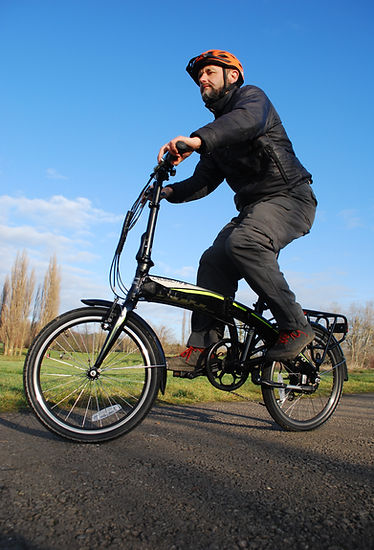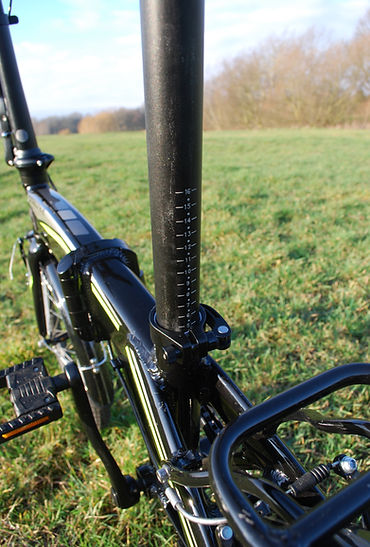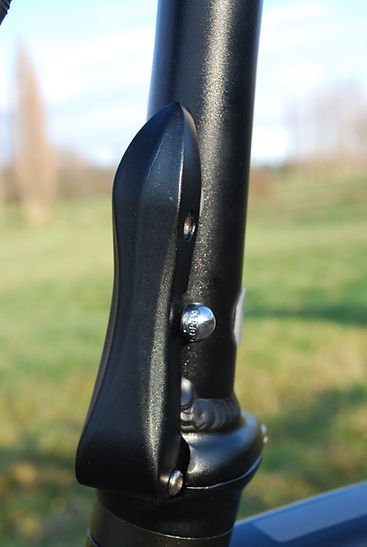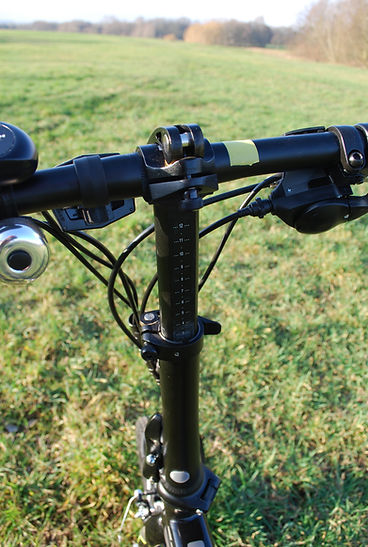
THIS SITE USES GOOGLE ANALYTICS TO ANALYSE TRAFFIC. CONTINUING TO USE THIS SITE MEANS YOU ACCEPT THE USE OF COOKIES.WE DO NOT COLLECT PERSONAL DATA LEARN MORE OR SEE OUR PRIVACY POLICY
SEVEN DAY CYCLIST
CYCLING, BUT NOT USUALLY RACING
LATEST UPDATE JANUARY 20th 2026
HOW DO WE REACH THE OVERALL RATINGS FOR PRODUCTS WE REVIEW?
CARRERA CROSSCITY FOLDING ELECTRIC BIKE
Halfords own brand
19.4kg £850 rrp (at time of publishing discounted to £750)
Carrera is Halfords’ own brand of bikes – and now e-bikes. They have a reputation for being excellent value for money and using sensible, well-specced components across a wide range of bikes.
I found the Carrera Crosscity Electric to be a sleek-looking electric folder that provided a nippy ride and was packed with practical features
Pros: Super value, well-equipped and a fast ride.
Cons: Folded bike needs bungee cords to keep it compactly folded.
Spec
At first glance the motor system on the Crosscity Electric is pretty old fashioned; a rear hub motor made by Chinese firm Bafang and a simple push button handlebar control for power level adjustment without any data display. In other words a budget type of motor system that has been around for a number of years and hardly seems to have changed.
But inspect the bike a little closer and you discover there have been subtle but important changes in the design of such budget systems over the years (well, this particular one at least) that really improve matters. Older designs fitted with hub motors would have wires trailing all over the place and whilst the cable runs on the Crosscity are still largely external, they are nice and tight and well-bundled together and not at all obtrusive and a plastic guard under the ‘mainframe’ means electric, gear and brake cables running from front to rear are unobtrusive and kept out of the way. Just what you want for riding, folding and carrying purposes.
Hub motors have become lighter and more discrete over the years and the Bafang model fitted to the Crosscity is a case in point. Added to the smooth runs of the cabling and the in-frame battery the net result is a bike that, at first glance, may be taken for a non-electric model.


There’s a couple of nice practical features, too; the power feed cable into the rear hub motor can be easily disconnected via the waterproof ‘jack’ type connection to make rear wheel removal almost as easy as on a non-electric bike and then there is a walk assist feature too. Walk assist is aimed to help you push the bike when dismounted, for example up steep slopes and carrying or pulling a heavy load just by pushing a button on the handlebar control. It will push the bike along at around 4mph.
Another nice touch is the USB charging point found hidden under the rubber charging point cover on the frame meaning you can charge phones, GPS units etc whilst riding (though it could be a little more conveniently located on the handlebars, so as you don’t need to trail a wire down to the frame).

The non-electric aspects of the bike are impressive too, with a nicely formed alloy frame and strong looking hinges and a quick release clamp ‘handlepost’ height adjuster (more on this in ‘The Ride’ section).
Creditably, Acera derailleur gears not the cheapest ‘non-series’ Shimano option and Promax V-brakes also seem to provide very reliable longstanding performance for sensible money.
Again rims and tyres confirm the idea that the Crosscity hasn’t simply been built down to a price, being double-wall alloy and Kenda-branded semi-slicks respectively. It would have been nice to see quick release skewers on the wheels rather than the heavier old-fashioned bolts though.
Extras
The Crosscity only really lacks LED lighting, coming with a decent-sized rear pannier rack, mudguards and a kickstand. These all looked up to the job of at least city commuting and I was particularly pleased with the pannier rack which took a full-sized pannier and still allowed me to pedal without heelcatch, though I had to move my feet slightly forward on the pedals to avoid this. We’ve already mentioned the USB charging port hidden under the mainframe ‘charging flap’ which also proved extremely useful.
The Ride
The unisex frame design had a geometry that was perfect for my 5’ 8” frame. The seating position was perfectly balanced for comfort whilst in the saddle and also allowed me to easily stand up out of the pedals for ‘honking’ up hills if I was in a sporty mood.

The seatpost adjustment gives an effective maximum frame size of a huge 67cm (down to a minimum that would fit the smallest conceivable rider) and 12 cm adjustment in the height adjustable handlepost means this bike should suit quite a wide range of heights.


Unlike many budget folders of old – perhaps best described as wobbly wonders – the Crosscity feels pretty rigid even when pedalling hard above the motor support limit. This was a really pleasant surprise to me given the length of the seatpost and handlepost and the fact the latter is two piece as it’s height adjustable.
The motor support compliments the bike’s riding characteristics beautifully; the three power levels are usefully graded with level one giving me useful support on the gentle inclines and in gentle winds, level two providing plenty of assistance up most hills with level three being held in reserve for the steepest of hills into headwinds. It’s a pretty quiet motor too, only being really noticeably audible to me at higher speeds and up steeper hills and even then it’s not really obtrusive.
As on all budget motor systems that use pedal motion (as opposed to the torque sensor system prevalent on higher priced systems) to trigger power delivery, there is some sensation of the motor power running on a little beyond your pedal stroke, but its not too noticeable on the Crosscity. The answer is to make sure your hands are poised above the brake levers at all times as light pressure on the them will activate the motor cut out.
The best motor characteristic was the lack of drag above the 15.5mph assist speed – I was able to carry on cycling above that limit to gain a few more valuable mph and get a nice refreshing workout too. On all too many motor systems there is an appreciable drag that makes cycling very hard work above the cut out limit but not on the Crosscity.

The tyres are best described as semi slicks and I found them ideal for my local riding mixing tarmac with decent quality towpaths and even better quality bridleways and farm tracks, all pretty sure under tyre after dry, mild winter we have had so far. On softer, slippier surfaces naturally they would struggle. If you ride mainly on tarmac changing to slicks would give the bike another lease of life in terms of speed and ease of riding above the cut out limit, though the semi-slicks fitted do a perfectly respectable job for their intended purpose. It can see the Crosscity as a great accompaniment to a canal boat or motorhome and even being pressed into service for bike-train commuting (though see ‘The Fold’ section below).
There are eight Shimano Acera gears providing a gear range of 290% (30.4 gears inches to 88.3 gear inches) which is fine for all but the most challenging of terrains and giving plenty of speed too – for reference it’s just shy of the impressive range of a six speed Brompton with factory gearing. Again the Acera is a good budget choice; not bargain basement and reasonably sturdy yet cheap to replace should it break. I never missed a gear with them and felt they were pretty smooth for a derailleur near the bottom of the Shimano range. Similarly the Promax V-brakes were sharp and effective and easy and cheap to maintain and they help keep the overall bike weight down a little compared to discs.
There are some compromises at this price of course. The pedal sensor power activation system as noted doesn’t give the smooth, sophisticated power delivery you get with torque sensors on pedalling, though at the two lower power levels power is still delivered pretty smoothly. In the top power level three it does come in surges unless you are riding where it’s really, really needed (e.g. steep hills).

The handlebar display is pretty basic, too, with no data display and simple lights to show the power level chosen and the amount of capacity left in the battery. The latter is particularly ineffective, most likely because it is simply measuring the voltage in the battery at any given moment, so it will fluctuate wildly depending on the power demand on the battery. It can dip to one light going up a steep hill and bounce book to a ‘full’ four lights on the flat. This is a common feature of all such systems but at least it’s useful to show you roughly how much power you are drawing at any given moment!
Power consumption looks reasonably efficient as long as you use the power levels sensibly and don’t use the top power level too much. I estimated I was using around 10 Wh a mile giving around a 30 mile range from the 313Wh battery, which removes from the frame for indoor charging. At 68kg I am a reasonably light rider and weather, track and terrain conditions were relatively benign, so I could image a heavier rider in much tougher conditions relying more on the motor assist getting only half this range. As with all range estimates the answer is ‘it depends...’.
The Fold
The ‘fold in half frame and drop the bars’ style fold is possibly the weakest point of the bike, but really only because it lacks any means of securing the frame bars together once folded, meaning you need to carry bungees or similar around with you. Without a secured fold the bike starts to unfold itself unless carried carefully and is difficult to stand upright in its folded form. too.

However, the fold is still an extremely useful feature if you do have securing ties of some kind, allowing you to fold down the bike quickly and easily. The overall 19kg+ weight counts a little against using the bike as a train plus bike commuter, but if you don’t need to lift the bike onto high up parcel type shelves it should be serviceable and fit into many train luggage racks with its reasonable folded size of 87 x 41 x 69 cm. A folding bike bag to fit the Crosscity would be a handy addition for Halfords to produce in this respect.

Alloy frames with hinges can have a tendency to slacken a little over time as the frame itself and component parts start to wear but its good to see that both the mainframe hinge and the handlepost hinge look robust, feel pretty stiff when riding, though I never apply the same standards to any folder’s stiffness under hard pedalling as to a non-folder (this applies doubly if you are a ‘heavy-handed’ rider). Best of all the hinges have adjustable fittings meaning any slack that develops in the hinges can be taken up by adjusting the inbuilt screw adjusters.
Conclusion
A wonderful sporty folder with a great motor system. If the fold could be made to hold together it would complete an already very impressive package.
Verdict: 4/5 What a budget e-folder should be, with only the fold details requiring a little attention.
Richard Peace
PUBLISHED FEBRUARY 2019







